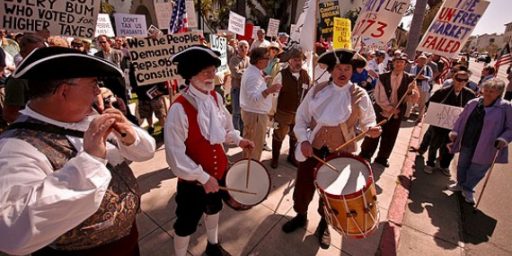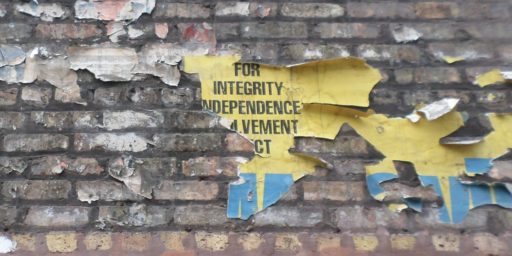Rules of Shadow War
James Woolsey and Robert Andrews argue against proposed legislation to place restrictions on clandestine military operations as on CIA black ops:
n airing of this idea appears in the current issue of Foreign Affairs (“The Rise of the Shadow Warriors,” [preview only-ed.] by Jennifer D. Kibbe of the Brookings Institution). Kibbe warns that without CIA-like controls on special units performing clandestine missions, “administration hawks may soon start using special (operations) forces to attack or undermine other regimes on Washington’s hit list.”
While such restrictions on CIA covert operations ? including requirements that the president report to Congress about every plan ? are appropriate to protect against rogue operations, they would hamstring clandestine military ones. CIA covert operations, no matter how sensitive the plans, require a clear chain of accountability. For example, in the 1980s, it was correct to require the president to notify Congress before the CIA provided arms to the Afghans fighting the Soviets.
When it comes to clandestine military operations in Iraq and elsewhere in the war on terrorism, however, similar layers of reporting and procedure will only discourage ideas from the field and delay operations that require quick action. Most military operations are kept secret beforehand in order to achieve success through stealth and surprise. In some cases, deception plays a major part in providing this secrecy.
Indeed, it has been an integral part of warfare since well before the Greeks breached the walls of Troy by hiding in the Trojan Horse. Without the elaborate deception operation that confused the Germans about when and where Allied landings would come in 1944, D-Day might have failed.
On a much smaller scale, today’s military operations require the same tight security and the ability to hide behind subterfuge. And, like Normandy nearly 60 years ago, once the battle is joined, once our Green Berets and SEALs rescue a hostage or capture or kill a terrorist, there will be no intent to deny American responsibility. Military operations are not covert operations that the government seeks to deny after the fact ? they are the fighting of a war.
Applying CIA-like controls to military operations could even restrict skilled U.S. military personnel from surveying potential battlefields around the world. It would certainly result in potentially dangerous delays that would prevent time-sensitive intelligence about terrorists from being acted on promptly. Had such requirements been in place in the fall of 2001, our Green Berets, SEALs and Air Force Special Operations would likely have had a much harder fight in Afghanistan, where just a handful of these trained professionals overthrew the Taliban and eliminated al-Qaeda’s principal sanctuary in just a few weeks.
The Defense Department’s Special Operations Command is now assuming the role of being the lead command in the war on terrorism. In fact, these elite forces during the past year have been assigned the most deployments in their 50-year history, including controlling two-thirds of combat operations in Iraq. We should do everything possible to make it easier, not more difficult, for the forces to react rapidly.
This argument strikes me as sound. While there’s no doubt that abuses could occur if relatively junior commanders are making decisions that could have big time policy impact, I would think the danger of inaction–or too slow action–outweighs this theoretical risk.






… “administration hawks may soon start using special (operations) forces to attack or undermine other regimes on Washington?s hit list.”
I sincerely hope so!
—